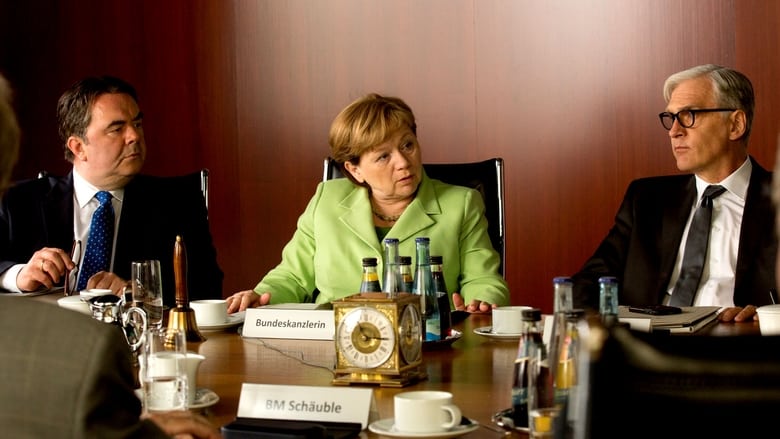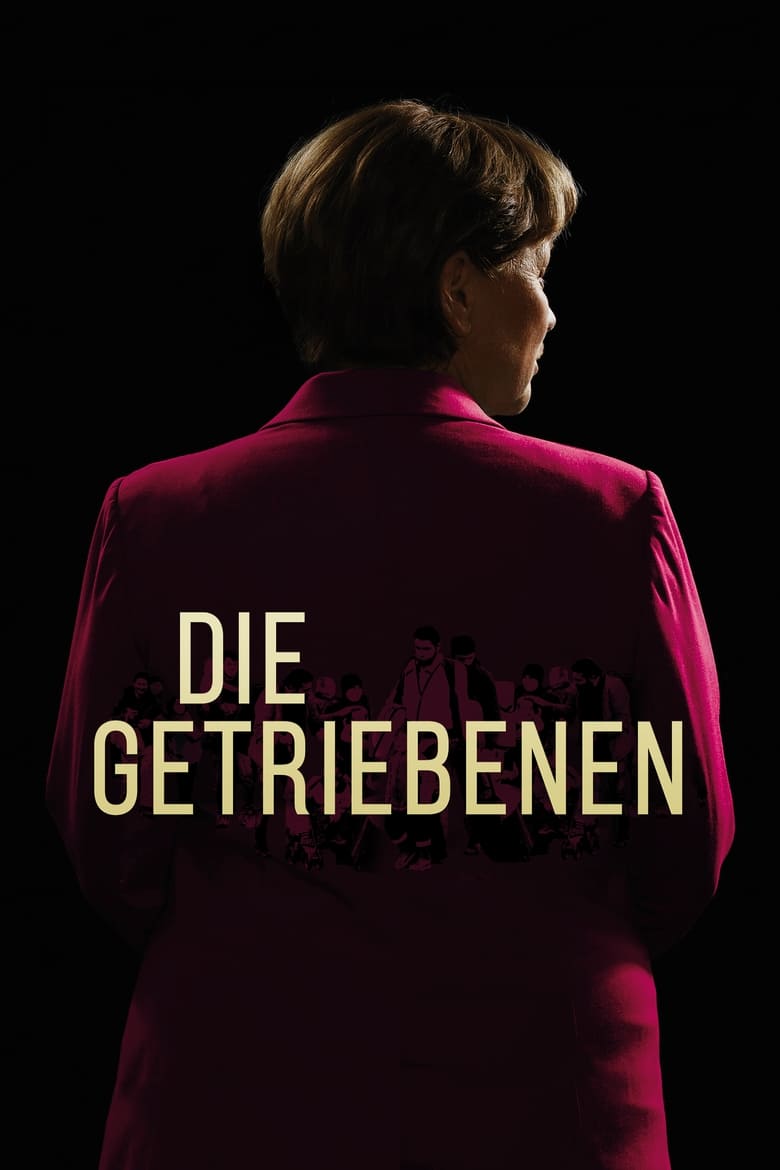Loading


Merkel: Anatomy of a Crisis
Genres
History
Overview
Angela Merkel's decision in autumn 2015 to open the borders for refugees split the country - some praised the moral stance, others criticized the surrender of sovereignty. Yet what would appear to be well-planned activity is in reality a policy of muddling along, chance, trial and error. The Driven Ones is a chronicle of the refugee crisis which shows that the political actors are being driven along, crushed between self-imposed constraints and events that have spun out of control.
Details
Budget
$0
Revenue
$0
Runtime
118 min
Release Date
2020-04-15
Status
Released
Original Language
German
Vote Count
13
Vote Average
6.115
Cast
Meet the talented actors who bring the movie to life.
Imogen Kogge
Angela Merkel
Josef Bierbichler
Horst Seehofer
Wolfgang Pregler
Thomas de Maizière
Tristan Seith
Peter Altmaier
Rüdiger Vogler
Wolfgang Schäuble
Timo Dierkes
Sigmar Gabriel
Walter Sittler
Frank-Walter Steinmeier
Gisela Aderhold
Beate Baumann
Silvina Buchbauer
Eva Christiansen
Urs Remond
Steffen Seibert
Uwe Preuss
Joachim Sauer
Hendrik Heutmann
Jens Spahn
Jürgen Fischer
Alexander Dobrindt
Germain Wagner
Jean-Claude Juncker
Justus Carrière
Manfred Schmidt
Simon Licht
Bernhard Kotsch
Oliver Urbanski
Philipp Steinberg
Peter Raffalt
Christoph Heusgen
Peter Kremer
Holger Münch
Michael Benthin
Hans-Georg Maaßen
Jörg Westphal
Dieter Romann
Angela Jacobi
Karoline Gernbauer
Judith Hofmann
Emily Haber
Radu Bânzaru
Viktor Orban
László I. Kish
Josef Czukor
Zsolt Bács
Janos Lázár
Bernhard Schir
Werner Faymann
Orlando Süss
Sebastian Kurz
Vasilis Spiliopoulos
Alexis Tsipras
Eva Hertwig-Schink
Karin Seehofer
Felix Hellmann
Backhaus
Similar Movies
Explore movies similar to this one that you might also enjoy.
7.9
Grand Illusion
A group of French soldiers, including the patrician Captain de Boeldieu and the working-class Lieutenant Maréchal, grapple with their own class differences after being captured and held in a World War I German prison camp. When the men are transferred to a high-security fortress, they must concoct a plan to escape beneath the watchful eye of aristocratic German officer von Rauffenstein, who has formed an unexpected bond with de Boeldieu.
1937-06-04 | fr
8.2
Night and Fog
Filmmaker Alain Resnais documents the atrocities behind the walls of Hitler's concentration camps.
1959-04-27 | fr
6.9
The Tin Drum
Oskar Matzerath is a very unusual boy. Refusing to leave the womb until promised a tin drum by his mother, Agnes, Oskar is reluctant to enter a world he sees as filled with hypocrisy and injustice, and vows on his third birthday to never grow up. Miraculously, he gets his wish. As the Nazis rise to power in Danzig, Oskar wills himself to remain a child, beating his tin drum incessantly and screaming in protest at the chaos surrounding him.
1979-05-02 | de
7.2
Labyrinth of Lies
A young prosecutor in postwar West Germany investigates a massive conspiracy to cover up the Nazi pasts of prominent public figures.
2014-11-06 | de
0.0
Unsere Städte nach '45
A documentation about the reconstruction and destruction of german cities after the 2nd World War.
2017-02-06 | de
6.0
Great Escape
The real Great Escape didn't feature Steve McQueen racing through the Third Reich on a motorcycle like in the 1963 movie, but the big breakout was still thrilling in every way. This program sheds new light on the audacious escape of 76 Allied airmen from a Nazi POW camp during World War II.
2004-11-16 | en
6.2
Sarajevo
The events in Sarajevo in June 1914 are the backdrop for a thriller directed by Andreas Prochaska and written by Martin Ambrosch, focusing on the examining magistrate Dr. Leo Pfeffer (Florian Teichtmeister) investigating the assassination of Archduke Franz Ferdinand. Trying to do his job in a time of lawlessness and violence, intrigues and betrayal, Leo struggles to maintain his integrity and save his love, Marija, and her father, prominent Serbian merchant. But the events of Sarajevo have set into motion an inescapable course of events that will escalate to become … the Great War.
2014-04-23 | de
8.5
Nuremberg: The Nazis Facing their Crimes
The documentary of the Nuremberg War Trials of 21 Nazi dignitaries held after World War II.
2006-10-25 | fr
6.5
A Midnight Clear
In 1944 France, an American Intelligence Squad locates a German Platoon wishing to surrender rather than die in Germany's final war offensive. The two groups of men, isolated from the war at present, put aside their differences and spend Christmas together before the surrender plan turns bad and both sides are forced to fight the other.
1992-04-24 | en
8.3
Paths of Glory
A commanding officer defends three scapegoats on trial for a failed offensive that occurred within the French Army in 1916.
1957-10-25 | en
6.8
Pope Joan
A 9th century woman of English extraction born in the German city of Ingelheim disguises herself as a man and rises through the Vatican ranks.
2009-10-22 | en
6.7
Mother Night
An American spy behind the lines during WWII serves as a Nazi propagandist, a role he cannot escape in his future life as he can never reveal his real role in the war.
1996-11-01 | en
8.0
The Nuremberg Trials
One journalist described it as a chance "to see justice catch up with evil." On November 20, 1945, the twenty-two surviving representatives of the Nazi elite stood before an international military tribunal at the Palace of Justice in Nuremberg, Germany; they were charged with the systematic murder of millions of people. The ensuing trial pitted U.S. chief prosecutor and Supreme Court judge Robert Jackson against Hermann Göring, the former head of the Nazi air force, whom Adolf Hitler had once named to be his successor. Jackson hoped that the trial would make a statement that crimes against humanity would never again go unpunished. Proving the guilt of the defendants, however, was more difficult than Jackson anticipated. This American Experience production draws upon rare archival material and eyewitness accounts to recreate the dramatic tribunal that defines trial procedure for state criminals to this day.
2006-01-30 | en
4.5
The Ode to Joy
Based on the true story of the Bandō prisoner-of-war camp in World War I. It depicts the friendship of the German POWs with the director of the camp and local residents at the stage of Naruto, Tokushima Prefecture, in Japan.
2006-06-17 | ja
6.5
The Last Valley
People in a small German village in the last valley to remain untouched by the devastating Thirty Years' War try to exist in peace with a group of soldiers occupying the valley.
1971-01-28 | en
6.0
The Pity of War
Professor Niall Ferguson argues that Britain's decision to enter the First World War was a catastrophic error that unleashed an era of totalitarianism and genocide.
2014-02-28 | en
6.6
Paragraph 175
During the Nazi regime, there was widespread persecution of homosexual men, which started in 1871 with the Paragraph 175 of the German Penal Code. Thousands were murdered in concentration camps. This powerful and disturbing documentary, narrated by Rupert Everett, presents for the first time the largely untold testimonies of some of those who survived.
2000-01-22 | de
7.0
Charlie Grant's War
A Canadian artist turned diamond merchant in Vienna, Austria risks his life to smuggle Jews out of the Third Reich.
1985-01-27 | en
4.4
Enfant Terrible
When 22-year-old Rainer Werner Fassbinder storms the stage of a small, progressive theatre in Munich 1967, and seizes the production without further ado, nobody suspects this brazen young rebel to become one of the most important post-war German filmmakers. Despite early setbacks, many of his films breakout at the most renowned films festivals and polarise audience, critics and filmmakers alike. His radical views and self-exploitation, as well as his longing for love, have made him one of the most fascinating film directors of this time.
2020-10-01 | de
6.7
Swastika
Comprised of video shot during the Nazi regime, including propaganda, newsreels, broadcasts and even some of Eva Braun's colorized personal home movies, we explore the way in which the Third Reich infiltrated the lives of the German population, from 1933 to 1945.
1974-01-17 | en